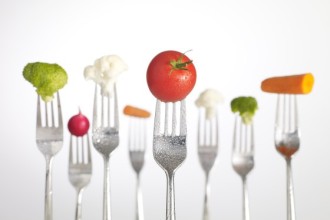The busier I get, the more stress I feel, the more stress I feel, the worse I eat, the worse I eat the worse I feel – it’s a vicious circle! Most of us have got hectic lifestyles and huge workloads, so it’s easy to understand why, at times of stress, we turn to quick and easy processed food. The problem is, this is when we most need a nutrient rich diet, to avoid vitamin deficiencies. And the double whammy? Stress compromises our digestion, so we may not be digesting and absorbing the nutrients we are consuming. The good news is that most deficiencies can be quickly resolved with simple dietary tweaks. Here’s 5 ways your body reveals a possible nutrient deficiency along with tips to resolve them:
- Sign: Muscle tension, twitches, cramps or spasms in toes, calves, arches of feet and backs of legs, feeling over-stimulated and fatigued, loss of appetite, apathy, confusion, insomnia, irritability, poor memory, and reduced ability to learn.
Possible deficiency: These symptoms may suggest a magnesium deficiency. When we experience prolonged or intense stress, our body releases adrenaline and cortisol. These stress hormones burn up our stores of precious mineral magnesium, essential for 300 biochemical reactions in the body. Stressors to watch out for and reduce:
- Nutritional: food sensitivities, vitamin and mineral deficiency
- Physical: over exercising, sustained manual labour, lack of sleep, frequent long distance travel
- Chemical: alcohol, caffeine, nicotine, drugs and environmental pollutants such as cleaning chemicals or pesticides
- Mental: worry, anxiety, perfectionism, long working hours
- Emotional: anger, loneliness, guilt, sadness, fear
- Traumatic: injuries or burns, surgery, illness or infections
- Psycho-spiritual: troubled relationships, financial or career pressure, challenges with life goals, spiritual alignment, happiness.
Tip: Eat bananas, almonds, hazelnuts, squash, cherries, apples, grapefruit, broccoli, bok choy, and dark leafy greens such as kale and spinach.
- Sign: Cracks at the corners of your mouth.
Possible deficiency: Iron, zinc, and B vitamins including niacin (B3), riboflavin (B2), and B12. Vegetarians and vegans are vulnerable to iron, zinc, and B12 deficiency.
Tip: Eat more poultry, salmon, tuna, eggs, oysters, clams, sun-dried tomatoes, Swiss chard, Tahini, peanuts, and legumes like lentils. Vitamin C enhances Iron absorption and also helps fight infection, so combine these foods with broccoli, red peppers, cauliflower and kale.
- Sign: A scaly red rash on your face (and sometimes elsewhere) and hair loss.
Possible deficiency: Biotin (B7) commonly known as the hair vitamin. Your body stores fat-soluble vitamins (A, D, E, K), but it can’t store most B or C vitamins which are water-soluble. Body builders and anyone with a taste for raw eggs are especially vulnerable as raw eggs contain a protein called avidin which inhibits the body’s ability to absorb biotin.
Tip: Increase your consumption of cooked eggs (cooking deactivates avidin), salmon, avocados, mushrooms, cauliflower, soybeans, nuts, raspberries, and bananas.
- Sign: Red or white acne like bumps, on the cheeks, arms and thighs.
Possible Deficiency: Essential fatty acids and vitamins A and D.
Tip: Reduce saturated fat and trans fats and increase healthy fats. Focus on adding salmon and sardines, walnuts and almonds, and seeds including chia, ground flax and hemp. Linwoods have a great variety http://www.linwoodshealthfoods.com/uk/. For vitamin A, increase leafy greens and colourful vegetables, such as carrots, sweet potatoes, and red peppers. This provides beta carotene, a precursor to vitamin A, which your body will use to make vitamin A. For vitamin D, I recommend a supplement – 2,000 IU a day, with added vitamins A and K, which help with D absorption http://www.hollandandbarrett.com/shop/product/betteryou-multivit-oral-spray-60031510
- Sign:Tingling, prickling, and numbness in hands, feet or elsewhere.
Possible Deficiency: B vitamins including folate (B9), B6, and B12. A deficiency may be affecting the peripheral nerves. Other symptoms include anxiety, depression, anaemia, fatigue, and hormone imbalances.
Tip: Increase your consumption of spinach, asparagus, beetroot (fresh, not pickled in sugar and vinegar), pinto, black, kidney and lima beans, eggs, mussels, clams, oysters and poultry.
Shani Shaker BA (hons), dipION, BANT, CNHC, is a registered nutritional therapist with a focus on regenerative and functional nutrition, disordered eating, addiction and mental health. Based in London her services include one-to-one coaching, group classes and Skype sessions. Contact her at [email protected]
Disclaimer: The information provided is intended for your general knowledge only and is not a substitute for professional medical advice or treatment for specific medical conditions. Please consult your healthcare provider with any questions or concerns you may have regarding your condition. Supplementation should only be temporary. If you’re eating a nutrient-rich diet, extra supplementation should only last for a month or two, just long enough to resolve the deficiency.
dipION, BANT, CNHC is a registered nutritional therapist with a focus on regenerative and functional nutrition, disord ered eating, addiction and mental health. Based in London her services include one-to-one coaching, group classes and Skype sessions. Contact her at [email protected]
ered eating, addiction and mental health. Based in London her services include one-to-one coaching, group classes and Skype sessions. Contact her at [email protected]
Disclaimer: The information provided is intended for your general knowledge only and is not a substitute for professional medical advice or treatment for specific medical conditions. Please consult your healthcare provider with any questions or concerns you may have regarding your condition. Supplementation should only be temporary. If you’re eating a nutrient-rich diet, extra supplementation should only last for a month or two, just long enough to resolve the deficiency.




